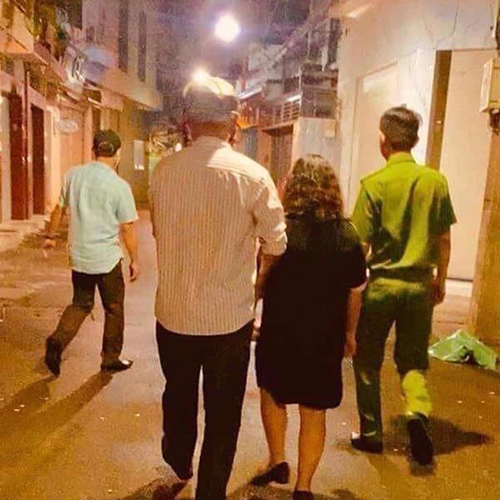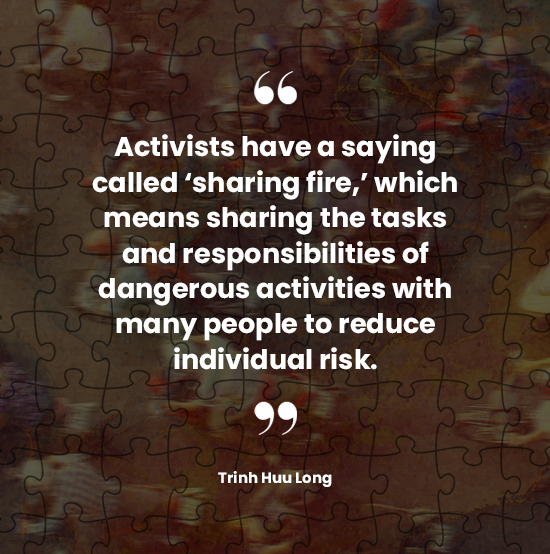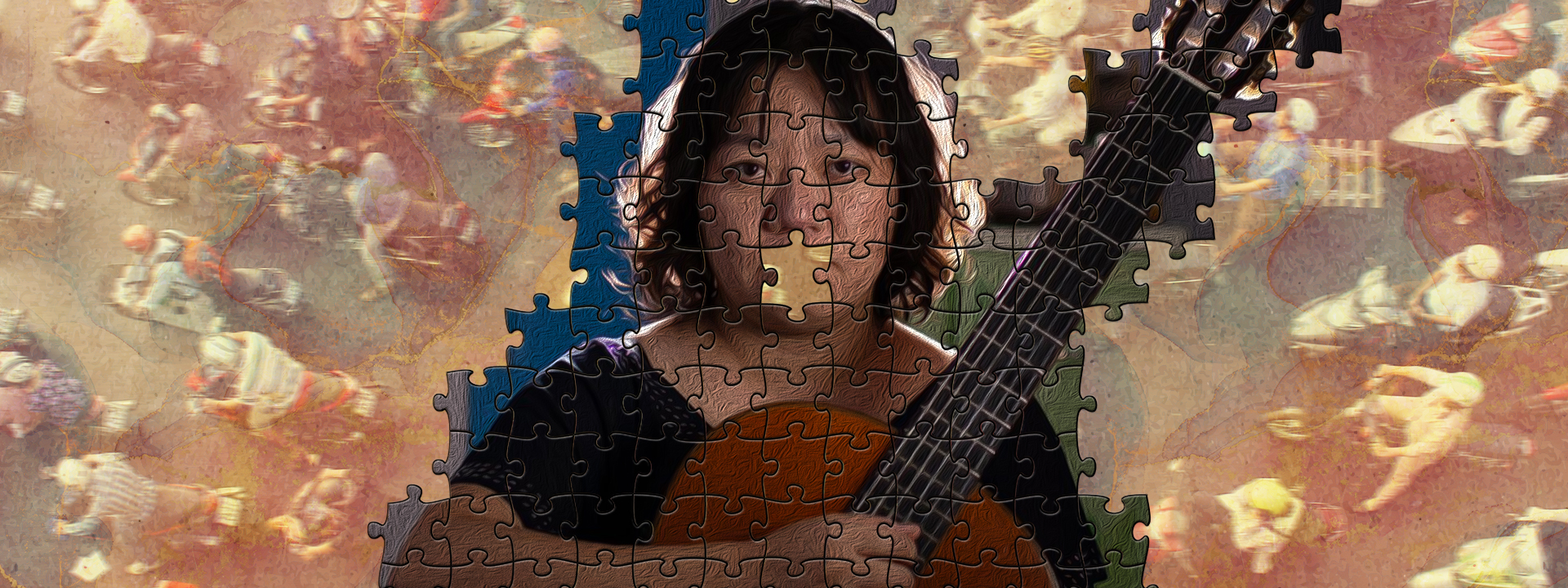By Trinh Huu Long; translated by Karie Nguyen
Editor’s note: On May 27, 2019, Vietnamese journalist and blogger Pham Doan Trang wrote the letter entitled, “Just In Case I Am Imprisoned.” It was her 41st birthday, and she was on the run. Doan Trang has no fixed address.
She gave the letter to an American friend and instructed him to release it to the public when she was arrested. In the letter, she asked that her friends not just campaign for her freedom but use her incarceration to fight for free elections and an end to single-party rule in Vietnam, reports the New York Times.
The outspoken journalist knew it was only a matter of time before the police came for her. She reports on civil rights issues in a country “where journalists and bloggers who do not toe the line of the current direction of the Communist Party face extremely severe repercussions,” said Daniel Bastard, who heads the Asia-Pacific Desk of Reporters Without Borders. Doan Trang has been beaten and imprisoned twice. The international press freedom monitor awarded her a 2019 Press Freedom Prize for Impact.
Doan Trang has written nine books, including “Politics for the Common Citizen.” She and her colleagues started Luât Khoa, an online magazine that specializes in providing information about legal issues. Doan Trang edits The Vietnamese, an independent and non-profit online magazine. This op-ed article was written in Vietnamese by Trinh Huu Long and was published in Luât Khoa on October 10, 2020 and on May 6, 2021 in The Vietnamese.
On October 6, 2020, mere hours after the United States and Vietnam held their 24th annual Human Rights Dialogue via virtual sessions, the police arrested Doan Trang on charges of making and disseminating propaganda against the Vietnamese state. She faces up to 20 years in prison.
As of November 2020, according to The 88 Project, a group which advocates for Vietnamese activists who are persecuted because of their peaceful dissent, Doan Trang’s family has not been allowed to see her. “Her family visited the detention center several times to bring her some supplies but could only see her signature on the receipt for the supplies.”
Every time an activist is arrested, several campaigns for his or her release emerge in response to the government’s persecution of human rights. This method is the oldest, most common, and most familiar form the common citizenry uses to call for justice.
I have been a part of those movements and have even organized several campaigns many times in the past nine years.
Yet, despite everything, I constantly ask myself, do these calls to action actually do any good? “How long am I going to do this,” I ask myself, “and are there any benefits in it or not?” These are just some of the questions that constantly linger in the back of my mind.
Most likely, the arrested activists will remain in prison; their sentence will be upheld. In fact, the length of their imprisonment might even be extended. Despite all our work, more and more people are still being incarcerated. There has been no change in our laws or institutions, despite all our efforts at home and abroad.
And even if we’re blessed with the smallest amount of luck, those arrested are granted asylum in another country, defeating the primary purpose of our campaigns.

Pham Doan Trang, imprisoned activist, blogger, journalist, and co-founder of The Vietnamese and Luat Khoa online magazines, has put some of my concerns to rest.
“I do not need my own freedom; I need something much more significant than that: freedom and democracy for the whole of Vietnam,” she wrote in a letter entitled, “Just In Case I Am Imprisoned.” “This goal sounds grandiose and far-fetched, but reaching it is actually possible with everyone’s help.”
Doan Trang wrote the letter on May 27, 2019, her 41st birthday, while she was on the run from the police. She wanted this letter to be released to the public only when she was indeed convicted and not when she was merely detained. Eventually, she was arrested and now faces a sentence of up to 20 years in prison.
If Doan Trang merely wanted freedom for herself, she had at least two opportunities to attain this in the past.
The first was after her nine-day criminal detention in 2009. If she was obedient and ceased all her activities regarding sensitive topics and cut all her ties with social elements deemed “anti-state,” she would have continued to live a safe and full life.
The second was when she studied in the United States and could have chosen a path towards residency or citizenship. In fact, at least three agencies and organizations wanted to sponsor her permanent stay in America.
So, why did Doan Trang choose to return to her homeland? It is because she understands that her freedom means nothing compared to the whole of Vietnam. Vietnam needs people to step up and work for the freedom of everyone.
Such a concept is simple and easy to understand, yet making it a reality is challenging to attain.
Doan Trang could have chosen to contribute to Vietnam’s fight from the outside as many others, including myself, are doing. Yet, she chose the most complex, most painful, and most difficult way to contribute to the cause. She returned home and faced the problem head-on. She published various works, wrote books, and even taught about democracy and freedom right in front of the police.
Doan Trang often told me that the best way to fight is to be an example, to be an inspiration for others to do the same. Only then can we, as a society, start to see what democracy, human rights, and the rule of law look like in reality. Words without actions are meaningless.
Sadly, I do not know how successful Doan Trang’s efforts have been, nor how many lives have been touched by her words and deeds. But regarding her arrest in October 2020, I would like to say this.
Activists have a saying called “sharing fire,” which means sharing the tasks and responsibilities of dangerous activities with many people to reduce individual risk. Sometimes we coordinate with each other, but more often than not this is not the case; people passively participate in this phenomenon without discussing plans in advance.
What if the deeds Doan Trang had done in the past five years were divided among five or 10 people? Would she still have been arrested? More recently, if she had not produced the two Dong Tam reports, would she be in jail right now? (Dong Tam, a village on the outskirts of Hanoi, was “the target of a violent raid by police January 2020 with the aim of suppressing resistance by residents contesting the seizure of their land by the authorities,” reports Reporters Without Borders.)
She often told me that these things are not difficult to accomplish and that there are many people who share similar ideas with her. If so, why are there so few people standing up for what is right? Granted, some people do, and Doan Trang was one of them. Yet because of inaction, apathy, or fear, she and the handful of brave, noble souls like her shoulder the entire risk.

Calls to free Doan Trang and other imprisoned activists are not enough. Instead, the Vietnamese people should break free “from the shackles of fear, apathy, and apprehension to actively fight for progress and change.”
Many of them will go to jail, while those who are content to watch from the sidelines will get angry again. They will once again clamor for the release and freedom of those imprisoned. But in the end, nothing gets done. Rinse and repeat.
Will we Vietnamese forever play the same old games with the government? Will we continue to sheepishly and ineffectively demand the release of our friends? Then, when nothing gets done, will we once again forget and return to the tolerated normalcy of life in this great prison that the government has made?
Things will be different if more people actively do their part to create social change, just like Doan Trang. Doing so has two advantages.
The first is to “share the fire” with those still fighting to reduce their risk and limit their chance of getting captured. Government resources are limited, and they can only invest in monitoring and controlling a few people.
 Those outside Vietnam can do their part as well. For instance, to write something similar to the Dong Tam Report, we just need to collect data on the internet and conduct interviews online or through the phone. It is not necessary to live in Vietnam physically to accomplish these tasks.
Those outside Vietnam can do their part as well. For instance, to write something similar to the Dong Tam Report, we just need to collect data on the internet and conduct interviews online or through the phone. It is not necessary to live in Vietnam physically to accomplish these tasks.
The second is to normalize press freedom, independent publishing, and political activities considered “sensitive.”
When these activities become commonplace, the government will be forced to accept them. This was observed in the past when private businesses were considered illegal. Nonetheless, they continued to operate, and gradually the government had to admit that these establishments were a fundamental component of the country’s economy. Since 1986, the state no longer considers owning a private business a criminal offense.
For me, the best way to help Doan Trang and people like her is to play a more active role. Eventually, everyone will benefit when the political space expands. No one will ever be arrested or imprisoned again for writing or publishing books. I will no longer have to clamor for one person’s freedom every single time someone gets arrested. I will finally be able to rest.
Calls for freedom are good, but they are often not enough. We should release ourselves from the shackles of fear, apathy, and apprehension to actively fight for progress and change.
Doan Trang has completed her mission and the responsibility now falls on our shoulders. Even if she were to be released tomorrow, even if she chooses to stay in Vietnam or decided to leave, the fight continues in each one of us.
And if you love Doan Trang, I implore you to do what she would have done. ●



















